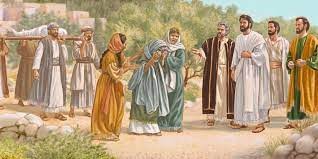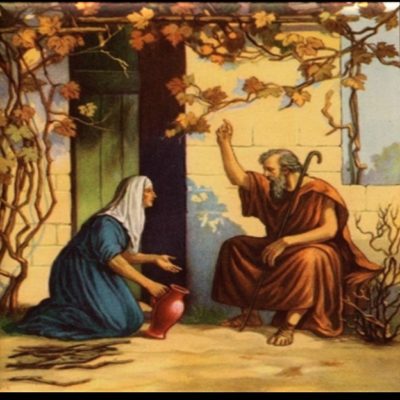Widow of Nain

The Widow of Nain tells the miracle of Jesus raising the widow’s son. We see the compassion Jesus has for the widow. Jesus has love and compassion for us as well. We see Jesus has the authority over death. We learn to glorify the LORD for all He does for us.
Luke 7:11-17
Nain is a village in Galilee located at the north base of Little Hermon which is also called the hill Moreh. It is about 4 miles from Tabor and 25 southwest of Capernaum.
When Jesus came to the gate of the city called Nain; and many of his disciples went with him, and much people. Behold, there was a dead man carried out, the only son of his mother, and she was a widow. There were many people of the city with her. And when the Lord saw her, he had compassion on her, and said unto her, Weep not.
Jesus came and touched the bier: the bier is an urn or receptacle for keeping the bones of the dead or funeral couch. Those that were carrying the funeral couch stood still. Jesus said, “Young man, I say unto you, Arise.”
The young man that was dead sat up, and began to speak. And Jesus delivered him to his mother. There came a fear on all: and they glorified God, saying, that a great prophet is risen up among us; and, That God has visited his people. And this rumor of Jesus went forth throughout all Judaea, and throughout all the region round about.
This brings to mind the Prophet Elisha who had performed a miracle that parallels the miracle Jesus performed with the Widow of Nain. Nain is approximately two miles north of Shunem. Shunem was located on the southern base of Mount Moreh. Nain, where Jesus raised the widow’s son, was just a short distance away on the north base of Mount Moreh.
One day Elisha was passing through Shunem, where a wealthy woman lived, who urged him to have a meal. So whenever he passed that way, he would stop there for a meal. The woman conceived and bore a son at that season, in due time, as Elisha had declared to her as a reward for her kindness to him. When the child was older, he went out one day to his father among the reapers. He complained to his father, Oh, my head, my head! The father said to his servant, Carry him to his mother. (2 Kings 4:8–37).
Elisha prayed unto the LORD, lay upon the child, and put his mouth upon his mouth, and his eyes upon his eyes, and his hands upon his hands: and he stretched himself upon the child; and the flesh of the child grew warm. The child sneezed seven times, and the child opened his eyes.
There are few similarities Elisha prayed to the LORD God. He did not have the power to bring the child back to life without the LORD God. Elisha breathed the breath of the LORD God into the child. The LORD God formed man of the dust of the ground, and breathed into his nostrils the breath of life; and man became a living soul. (Genesis 2:7).
Jesus had compassion on the widow of Nain. All it required for Jesus was to see the widow of Nain, have compassion on her, and tell her not to weep. Jesus then touched the bier then told the young man to arise. Jesus had the authority over death. Just as the Father raises up the dead, and quickened them; even so the Son quickened whom he will. (John 5:21). Quicken means to produce alive, to cause to live, make alive, give life. (Strong. 2001. #2227). The key difference is that Jesus has the authority to heal, give life, make life, to whom He wills. Those who hear His words, and believes on the LORD God, has everlasting life, and shall not come into condemnation; but passes from death unto life. The dead shall hear the voice of the Son of God: and they that hear shall live. Just as the LORD God has life in himself; so has He given to the Son, Jesus Christ, to have life in himself; and has given him authority to execute judgment also, because he is the Son of man. The hour is coming, in which all that are in the graves shall hear his voice, and shall come forth; they that have done good, unto the resurrection of life; and they that have done evil, unto the resurrection of damnation. (John 5:24-29).
The widow of Nain did nothing what so ever to gain the compassion of Jesus. She is not the only person to whom Jesus showed compassion. He showed compassion:
Jesus showed compassion toward the Multitude:
When Jesus saw the multitudes, he was moved with compassion on them, because they fainted which is weakened and exhausted, and were scattered abroad or thrown down, as sheep having no shepherd to guide them or care for them. (Matthew 9:36). The feeding of the five thousand is another example Jesus went forth, and saw a great multitude, and was moved with compassion toward them, and he healed their sick. When the evening came there was no villages where they could buy food the disciples wanted to send the people, those that had needs and needed Jesus most.
But Jesus said unto them, they need not depart; give them food to eat. (Matthew 14:14-16). Jesus was upon the mountain by the Sea of Galilee and the great multitudes came unto Him, having with them those that were lame, blind, dumb, maimed, and many others, and cast them down at Jesus’ feet; and he healed them: the multitude saw the dumb to speak, the maimed to be whole, the lame to walk, and the blind to see: and they glorified the God of Israel. Then Jesus called his disciples unto him, and said, I have compassion on the multitude, because they continue with me now three days, and have nothing to eat: and I will not send them away fasting, lest they faint in the way. He took the seven loaves and the fishes, and gave thanks, and brake them, and gave to his disciples, and the disciples to the multitude. They did all eat, and were filled: and they took up of the broken meat that was left seven baskets full. There were four thousand men, beside women and children. (Matthew 15:31-38).
Jesus showed compassion toward the Unfortunate:
Two blind men were sitting by the way side, when they heard that Jesus passed by, cried out, saying, Have mercy on us, O Lord, thou Son of David. The multitude told them to hold their peace, but the two blind men continued to cry the more, And Jesus stood still, and called them, and them what they wanted. They told Jesus they wanted their eyes to be opened. Jesus had compassion on them, and touched their eyes: and immediately their eyes received sight, and they followed him. (Matthew 20:30-34).
Jesus showed compassion toward the Leper:
A leper came to Jesus, beseeching Him, and kneeling down to Him, and saying unto Him, if you will, come make me clean. Jesus, moved with compassion, put forth His hand, and touched him, and said unto him, I will; be thou clean. Just as soon as Jesus had spoken, immediately the leprosy departed from him, and he was cleansed. (Mark 1:40-41). It is important to recognize that in this case with the leper he first went to Jesus, called to Jesus, kneeled down to Jesus, then asked Jesus if He would make the leper clean.
This story about the widow of Nain has caused some hurt feelings from other people who have lost loved one to death. Because the widow of Nain did not call on Jesus to raise her son that tells me that there must have been another reason why Jesus raised her son from being dead. We must remember that she was already a widow and Jesus did not just show up and raise her husband. It was at Nain the first time Jesus showed His authority over death. “No man can come to me, except the Father which hath sent me draw him: and I will raise him up at the last day.” (John 6:44). Just as the Father raises up the dead, and quickened them; even so the Son quickened whom he will. (John 5:21). We know that Jesus is the Resurrection, and the life: “he that believeth in me, though he were dead, yet shall he live: And whosoever liveth and believeth in me shall never die. Believest thou this? “(John 11:25).
It can be said that the reason why Jesus had compassion on the widow of Nain was for the purpose to show the multitude the greatness of the LORD God. There came a fear on all the multitude that had come to offer the widow support: and they glorified God, saying, “That a great prophet is risen up among us; and, That God hath visited his people. And this rumor of him went forth throughout all Judaea, and throughout all the region round about.’ (Luke 7:16). The main point of the widow of Nain is Jesus has the right to show compassion on whoever He desire to show compassion upon. Just like you and I have the right to show compassion for whatever reason to whomever we choose.
“But thou, O Lord, art a God full of compassion, and gracious, longsuffering, and plenteous in mercy and truth.” (Psalm 86:15).
“And God shall wipe away all tears from their eyes; and there shall be no more death, neither sorrow, nor crying, neither shall there be any more pain: for the former things are passed away.” (Revelations 21:4.)
Reference:
Strong, James. (2001).The New Strong’s Expanded Exhaustive Concordance of the Bible. Nashville: Thomas Nelson Publishers.
Cite Article Source
MLA Style Citation:
Holstein, Joanne “Widow of Nain:.” Becker Bible Studies Library Feb 2015.< https://guidedbiblestudies.com/?p=2226,>.
APA Style Citation:
Holstein, Joanne (2015, February) “Widow of Nain:.” Becker Bible Studies Library. Retrieved from https://guidedbiblestudies.com/?p=2226,.
Chicago Style Citation:
Holstein, Joanne (2015) “Widow of Nain:.” Becker Bible Studies Library (February), https://guidedbiblestudies.com/?p=2226, (accessed).


